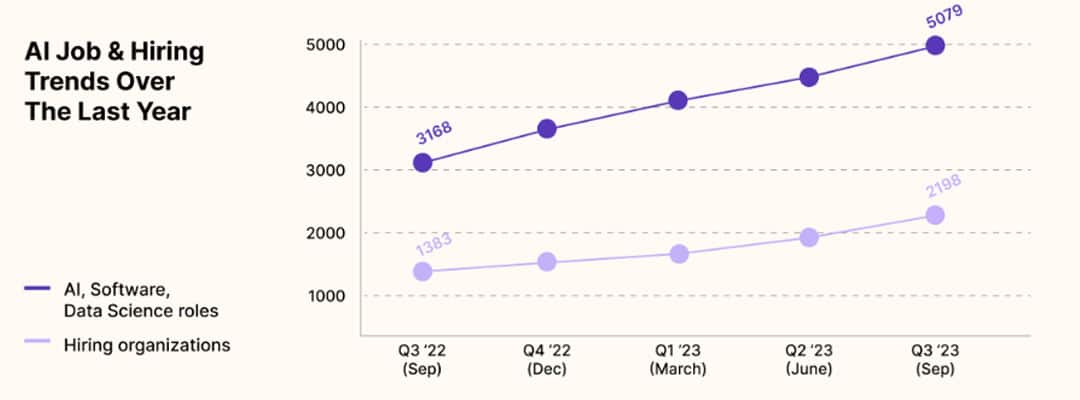The landscape of Artificial Intelligence (AI) is undergoing a significant transformation, driven by technological advancements and rapid commercial adoption. This shift has not only captured the attention of the media and the general public but has also significantly influenced the global job market. Deel, a global Human Resources startup, has analyzed this trend in its annual report on international hiring, covering the period from September 2022 to September 2023, revealing key data on the growth in the hiring of AI specialists.
According to the report, there has been a considerable increase in the hiring of specialized roles in AI globally, both in terms of professionals hired and companies interested in these profiles. By September 2023, more than 5,000 active AI-related contracts were registered, occupied by over 2,100 companies. These contracts include positions such as data researchers and systems engineers.
The growth in this sector is notable. Between September 2021 and 2023, the number of AI-related positions hired through Deel increased by 60%, and the number of companies hiring for AI, data science, and systems engineering roles grew by 59%. The United States leads in hiring for these roles, followed by Canada, the United Kingdom, and Germany. However, Canada is the leader in terms of the number of AI workers hired, with India, Spain, Germany, and the United Kingdom completing the list.

Regarding salaries, the report indicates notable variations by region. Notably, Latin America has seen a sustained increase in the average salary, rising from USD $71,000 in September 2022 to USD $73,000 in September 2023 (annual average income). This data indicates that being an AI specialist is a priority role globally, regardless of the region.
The rapid adoption of AI has required a hiring rate that surpasses traditional barriers, facilitated by innovative hiring models like the Employer-of-Record (EOR). This model allows companies to assume all employment-related responsibilities in the country where the worker is located, facilitating the incorporation of highly qualified talent across borders.
Since the launch of technologies like Chat GPT, the internationalization of AI talent has been notable. India is strongly positioning itself with new AI-related roles, including AI engineers and training leaders. Countries like Brazil, Canada, and Argentina are also increasing their hiring of specialized AI talent.

Key cities such as Toronto, Bangalore, and London have seen an increase in the hiring of these professionals, as well as Lahore, Berlin, and Buenos Aires. Interestingly, the United Kingdom and Canada are hiring AI professionals from the United States.
The most significant growth in new contracts was observed in Germany, the United States, and the United Kingdom, indicating a growing trend towards the diversification and globalization of AI talent. This trend reflects not only a change in job demands but also how companies worldwide are reevaluating their hiring strategies to include and leverage AI expertise, marking a new chapter in the history of technology and employment.
AI and the Job Market
Despite the concerns that Artificial Intelligence (AI) generates in terms of its impact on the job market and its potential power, there is a more optimistic view of its future. The World Economic Forum, in a 2020 report, pointed out that although automation could displace 85 million jobs by 2025, it could also create 97 million new jobs. This perspective suggests that even basic knowledge of AI tools can be attractive to employers.

Gilbert F. Houngbo, Director-General of the International Labour Organization (ILO), stated that “artificial intelligence is unstoppable” and we must accept its continual advancement. However, he also highlighted that technological and digital advances generally create more jobs than they destroy, as told to the EFE news agency.
The key to AI within the workforce is to integrate the technology to improve efficiency and facilitate work tasks. While there are jobs that will be created by AI that cannot currently be foreseen, the importance of adapting to and learning about these emerging technologies becomes increasingly essential for the new generations of workers.
And although various experts point out that there are still challenges, such as the suboptimal working conditions of those training AI systems, many of whom are low-income workers in developing countries, we must accept that AI is already an integral part of our lives and that the acceptance of the use of these tools and technologies is increasingly widespread.

Indeed, Latin America is beginning to position itself as a region open to exploring the development and use of Artificial Intelligence. In different countries such as Mexico, Colombia, or Chile, to name a few, there are study centers and training initiatives that respond to the current market demands regarding Artificial Intelligence. Additionally, according to a survey published by Statista countries like Mexico, Peru, Colombia, and Chile have high acceptance of the use of Artificial Intelligence among their inhabitants, in what is undoubtedly a market of enormous interest and value for technologies of this kind.
